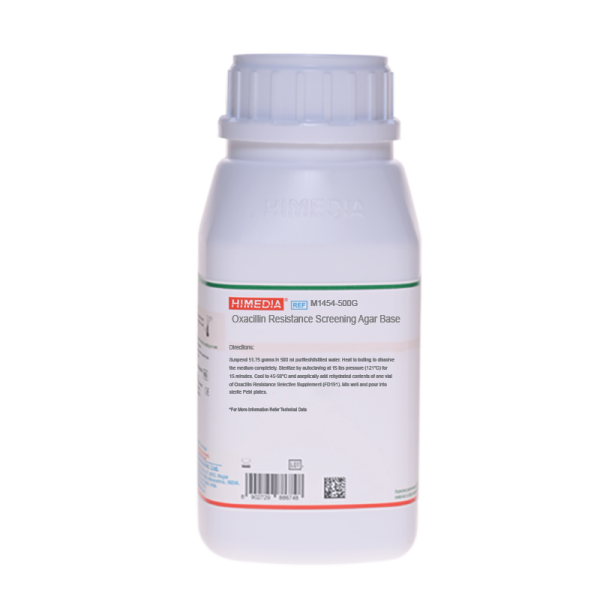 Your enquiry has been submitted
Your enquiry has been submitted
Oxacillin Resistance Screening Agar Base
Intended Use
Recommended for screening oxacillin resistant microorganisms from clinical samples.
Composition
| Ingredients | g / L |
|---|---|
| Peptone | 11.800 |
| Yeast extract | 9.000 |
| Mannitol | 10.000 |
| Sodium chloride | 55.000 |
| Lithium chloride | 5.000 |
| Aniline blue | 0.200 |
| Agar | 12.500 |
Final pH (at 25°C): 7.2±0.2
**Formula adjusted, standardized to suit performance parameters
Directions
Suspend 51.75 grams in 500 ml purified/distilled water. Heat to boiling to dissolve the medium completely. Sterilize by autoclaving at 15 lbs pressure (121°C) for 15 minutes. Cool to 45-50°C and aseptically add rehydrated contents of one vial of XA Selective Supplement (FD191). Mix well and pour into sterile Petri plates.
Principle And Interpretation
Oxacillin Resistance Screening Agar (originally named MRSA Screen Agar) was originally developed for the detection of methicillin-resistant Staphylococcus aureus (MRSA). These strains are resistant to penicillinase-resistant penicillins (PRPs), such as methicillin, oxacillin and nafcillin. Since the method to detect MRSA uses the same inoculum as the Bauer-Kirby antimicrobial disc susceptibility test procedure, the oxacillin screen test may be conveniently performed on isolates at the same time as routine susceptibility testing.
The coagulase positive species of Staphylococcus aureus is well documented as a human opportunistic pathogen. As a nosocomial pathogen, Staphylococcus aureus has been a major cause of morbidity and mortality (1). Resistance to penicillin in S. aureus was observed soon after the introduction of penicillin in the late 1940s (2). By the late 1960s, methicillin/oxacillin resistant strains of S. aureus began to emerge and has been isolated in the United States (3). Oxacillin (methicillin) resistant S. aureus emerged in 1980s as a major clinical and epidemiological problem in hospitals (4).
Peptone and yeast extract provide nitrogenous nutrients. Mannitol is the differential fermentable carbohydrate. Most coagulase-negative species of Staphylococci and Micrococci do not ferment mannitol. High sodium chloride content (5.5%) makes the medium selective. Lithium chloride inhibits many contaminating organisms except for Staphylococcus aureus. Aniline blue is an inert and ideal indicator of lipolysis when lipase substrates are added to the medium (5).
Occasionally S. aureus isolates with borderline resistant MICs may not grow within 24 hours. It is recommended that any equivocal results demonstrated on the screening plate be confirmed with a standard MIC test. The likelihood of the emergence of the resistant subpopulation is greater in a large population of bacterial cells. The oxacillin resistance of bacterial isolates growing on Oxacillin Resistance Screen Agar should be further confirmed by agar or broth dilution. Also the isolates resistant to other antimicrobial agents should be determined that is characteristic of MRSA. The use of Oxacillin-Resistance Screening Agar for the detection of methicilin/ oxacillin resistant coagulase-negative Staphylococci is not recommended.
Any growth even one colony, indicates that the isolate is methicillin (oxacillin) resistant. No growth indicates that the organism is susceptible to methicillin and oxacillin. Isolates that grow on Oxacillin Resistance Screen Agar should be reported as resistant to all ß-lactam antimicrobial agents, including ß-lactam/ ß-lactamase inhibitor combinations and cephalosporins.
Type of specimen
Isolated Microorganisms from clinical samples.
Specimen Collection and Handling
For clinical samples follow appropriate techniques for handling specimens as per established guidelines (6,7). After use, contaminated materials must be sterilized by autoclaving before discarding.
Warning and Precautions
In Vitro diagnostic use only. For professional use only. Read the label before opening the container. Wear protective gloves/protective clothing/eye protection/ face protection. Follow good microbiological lab practices while handling specimens and culture. Standard precautions as per established guidelines should be followed while handling clinical specimens. Safety guidelines may be referred in individual safety data sheets.
Limitations
- The oxacillin resistance of bacterial isolates growing on Oxacillin Resistance Screen Agar should be further confirmed by agar or broth dilution.
- The isolates resistant to other antimicrobial agents should be determined that is characteristic of MRSA.
Quality Control
Appearance: Yellow to grayish yellow homogeneous free flowing powder
Gelling: Firm, comparable with 1.25% Agar gel.
Colour and Clarity of Prepared medium: Blue coloured clear to slightly opalescent gel forms in Petri plates
Reaction: Reaction of 10.35% aqueous solution at 25°C. pH : 7.2±0.2
pH: 7.00-7.40
Cultural Response: Cultural characteristics observed with added XA Selective Supplement (FD191), after an incubation at 35-37°C for 18-24 hours.
| Organism | Growth |
|---|---|
| Staphylococcus aureus ATCC 29213 (00131*) | inhibited (susceptible to oxacillin) |
| Staphylococcus aureus ATCC 38591 | fair to good (presence of colony or haze of growth should be read as resistance) |
Key : *Corresponding WDCM numbers.
Storage and Shelf Life
Store between 10-30°C in a tightly closed container and the prepared medium at 2-8°C. Use before expiry date on the label. On opening, product should be properly stored dry, after tightly capping the bottle in order to prevent lump formation due to the hygroscopic nature of the product. Improper storage of the product may lead to lump formation. Store in dry ventilated area protected from extremes of temperature and sources of ignition. Seal the container tightly after use. Product performance is best if used within stated expiry period.
Disposal
User must ensure safe disposal by autoclaving and/or incineration of used or unusable preparations of this product. Follow established laboratory procedures in disposing of infectious materials and material that comes into contact with clinical sample must be decontaminated and disposed of in accordance with current laboratory techniques (6,7).
Reference
- Murray P. R., Baron J. H., Pfaller M. A., Jorgensen J. H. and Yolken R. H., (Eds.), 2003, Manual of Clinical Microbiology, 8th Ed., ASM, Washington, D.C.
- Florey H. W., Chain E., Heatley N. G., Jennings M. A., Sanders A .G., Abraham E. P., and Florey M. E., (Ed.), Antibiotics, Vol. II, Oxford University Press, London.
- Barrett F. F., McGehee R. F. Jr., and Finland M., 1968, Methicillin-resistant Staphylococcus aureus at Boston City Hospital, Bacteriologic and epidemiologic observations. N. Engl. J. Med. 279:444-448.
- Boyce J. M, 1990, Infect. Contrl Hosp. Epidemiol., 11: 639-642.
- Starr, 1941, Science, 93: 333
- Isenberg, H.D. Clinical Microbiology Procedures Handbook 2nd Edition.
- Jorgensen, J.H., Pfaller, M.A., Carroll, K.C., Funke, G., Landry, M.L., Richter, S.S and Warnock., D.W. (2015) Manual of Clinical Microbiology, 11th Edition. Vol. 1.
| Product Name | Oxacillin Resistance Screening Agar Base |
|---|---|
| SKU | M1454 |
| Product Type | Regular |
| Physical Form | Powder |
| Origin | Animal |
| Packaging type | HDPE |
| References | 1. Barrett F. F., McGehee R. F. Jr., and Finland M., 1968, Methicillin-resistant Staphylococcus aureus at Boston City Hospital, Bacteriologic and epidemiologic observations. N. Engl. J. Med. 279:444-44 |
| Customized Product Available | No |





